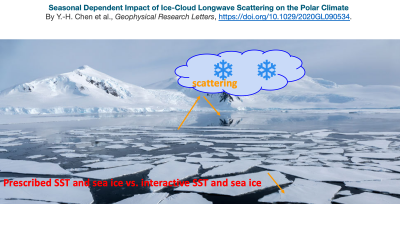Seasonal Dependent Impact of Ice‐Cloud Longwave Scattering on the Polar Climate
Cloud longwave scattering has been ignored in over majority of current earth system models. We first offered a series of arguments based on the physics of ice cloud scattering and radiative transfer to explain why the longwave scattering effect is expected to be prominent in the high latitudes. Then we use numerical model simulation to confirm our arguments, showing that it is the surface-atmosphere longwave coupling that makes the longwave scattering matter in the high-latitude climate, especially over the wintertime.
Our study challenges the traditional wisdom of ignoring longwave scattering in the earth system model. It stresses the role played by atmosphere-surface radiative coupling to manifest the climatic effect of longwave scattering, especially during polar winter when longwave radiation dominantly determines the surface temperature. The direct implication of our study is that all climate models need to take longwave scattering into account for faithful representations of high-latitude climate processes. It is a necessity instead of an option.
Our study here explained and numerically verified why the traditional wisdom of neglecting longwave scattering breaks down for the simulation of high-latitude climate in the fully coupled models. We pointed out the critical importance of atmosphere-surface radiative coupling for correctly assessing the role of cloud longwave scattering in climate simulation, an issue overlooked by all previous studies regarding the treatment of cloud longwave scattering in climate models. The direct implication of our study is that all climate models need to take longwave scattering into account for faithful representations of high-latitude climate processes. It is a necessity instead of an option.

